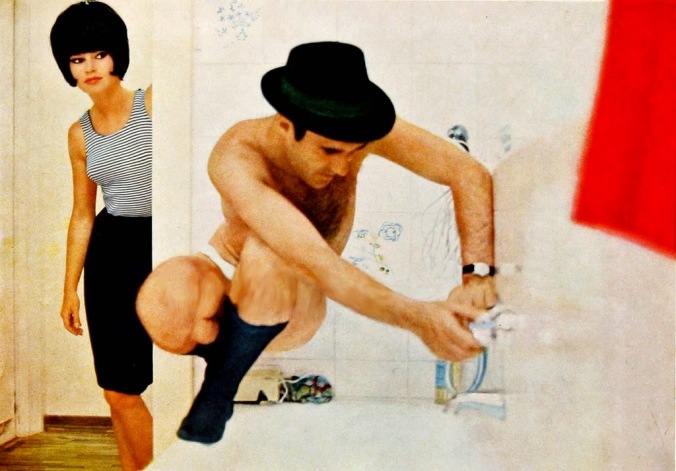
Tim O’Brien thanked the audience and left the podium of a small theatre in Toronto’s Harbourfront Centre. He spoke briefly to the man who’d introduced him, then departed quickly, before the clapping had swelled into a standing ovation. The lauded American novelist had been reading to the gathered participants of 2016’s Humber School For Writers fall short course. The piece he’d shared was part of an essay in progress, written about his father, and his own sons, and the relationship the three generations have all had with the writings of Ernest Hemingway. He went a quarter of an hour over the allotted time, carrying right through the usual question-and-answer period. He was the final speaker on the final day of a workshop that concluded when he did. But he kept going. He read until white flecks formed in the corners of his mouth, and his voice broke, and the “Humber School For Writers” sign on the lectern lost its stick and began to fall.
He was baring his inner thoughts. Some of the divulgences he had made public over the last five decades in his work, such as his feelings on the meaningless of war; and his assessment of the unyielding, unending, and impersonal passage of time. Other insights felt more private, like what a nasty thing an old man can be; the covetous way a writer will read the good work of another; and what it is to be an elderly father of young children, and know that you are unlikely to see them celebrate the birthdays of their late-20’s. He also spoke of his own deceased father, who told him to read five Hemingway stories on a summer’s afternoon when Tim was a kid, but didn’t stick around to hear what his young son thought about them.
He poured this out, without warning, preamble, or asking permission to mentally disrobe, and made us all face the intimate immediacy of his humanity. It was a remarkable thing. His expression as he departed was much the same as that of his audience: more than just a little moved, and not entirely ready to rejoin the everyday bustle of a city midway through an ordinary weekday afternoon.
Every year for the last 25 Toronto’s Humber College has offered an intensive writing program centred around established authors leading small groups of six or seven aspiring writers in the process of editing their ongoing projects. Some of the notable literary figures taking part in the latest iteration were Lawrence Hill (Book of Negroes), Isabel Huggan (Belonging: Home Away From Home), Joe Kertes (Winter Tulips), and Alison Pick (Far To Go). I was one of seven students assigned to Tim O’Brien’s group, an author and journalist best known for his work based on his experiences in the Vietnam war, in particular Going After Cacciato, winner of the United States’ National Book Award. Tim wasn’t initially what I expected. By the time he walked out of that small theatre six days after we met, he wasn’t what I secondarily expected either.
I took the course because, after years of wilful neglect, the urge to write had become overwhelming. Write about what, and to whom, remained unclear, but at the worst possible time – having two young kids and a job that takes me away to sea for six months of the year – the desire to do this specific thing, through this specific medium, was demanding attention in a way that couldn’t be ignored. So I applied to Humber College’s ‘Creative Writing Short Course,’ submitting, as part of the application, a story that was long on feeling and short on plot. It was accepted, and a little over a month later I found myself cycling from our house in Toronto’s west end, down through High Park to The Lakeshore, and on to Harbourfront where the course would be held. My bike is old, and needed a service it still hasn’t received, so I creaked along the paved-over shoreline of our inland ocean, wondering if this had been a good idea.
That first day was the Sunday meet-and-greet. The introductions took place in a light, airy conference room at the Harbourfront Centre, with a bar set up to help facilitate the process, stocked with chalky red wine. Tim waited patiently for everyone to arrange themselves around the table before leaning forward, not unlike a turtle sticking its head out of a favoured hole, and telling our newly assembled group: “I’m not exactly a hard-ass. But I am inexactly one.”
He seemed to fit the profile. He wore a leather bomber jacket with a sheepskin collar, aviator glasses, and an ever-present baseball hat that he admitted to putting on every morning as soon as he got out of bed. He told us he would smoke every break he gave us, called Texas home, and had served in the Vietnam War. I think many of us expected Monday morning to begin with some version of a drill sergeant inserting writing references into Full Metal Jacket quotes. “The [commas] only know one thing: it is better to be alive.”
It was anything but. While Tim did start out with basics – “We only have 26 characters and a handful of punctuation marks, how we use them matters” – his critiques were kind, and he moved our group quickly into exercises intended to demonstrate the benefits gained by moving the focus of the story from fine detail, to large themes, and then back to the detail, to create engaging undulations in the narrative arc. It was helpful guidance that everyone took to heart, and the group responded positively to Tim’s hard-bitten, soft hands approach, and the useful insights he had gained over a long career as a professional writer. But that wasn’t all of what O’Brien wanted to pass along.
It was mid-morning on Wednesday of the week-long course, when Tim hunched deeper over the table from his already low crouch, and got down to business. He had just returned from a cigarette break that was cut short by the sub-zero temperature, and announced that he was going to read to us from The Aleph, by Jose Luis Borges; a story that centres around a small, enigmatic, glowing sphere (the Aleph) that appears in the otherwise normal basement of a woman who has recently died.
“The main character, who is basically the author, Borges, looks into the Aleph,” Tim explained, leaning into his dog-eared, post-it filled copy of the story. “And sees everything. At once. Without distortion.” And then he read a remarkable section of the story to us, in which the protagonist describes what he sees when he looks into the sphere. Tim’s voice, which is much bigger than you would expect it to be, rose and fell with the natural cadence that Borges built in to the section with the repetition of the phrase ‘I saw’ before each new revelation.
“I saw the multitudes of America,” Tim read, his elbows out and hands splayed widely across the book in front of him, as though holding a basketball underwater. “I saw the convex equatorial deserts and each one of their grains of sand. I saw a splintered labyrinth (it was London). I saw a woman in Inverness whom I shall never forget. I saw her tangled hair, her tall figure, I saw the cancer in her breast.” Tim paused for a moment before moving on, continuing to select his favourite lines in the passage, his voice swelling to fill the room. “I saw a Persian astrolabe. I saw the delicate bone structure of a hand. I saw the survivors of a battle sending out picture postcards.” Here Tim stopped for a longer breath, and the jut of his jaw switched sides. When he continued his voice had a hitch in it, and he spoke deliberately.
“I saw your face.” O’Brien let out a long sigh then, before looking up. He was wearing an odd expression. “He saw your face,” he told us quietly. And then again, this time as a loud, forceful imperative. “He. Saw. You. He saw you!” More than 70 years since Borges wrote that story, the intimate immediacy of his dustless thoughts spun briefly in the middle of the room. And we all handled these simple, but powerful, mental images with our own minds, turning them over carefully in silence.
After that we took a break, during which I used my phone to order the short stories of Jose Luis Borges.
This was how the week passed. Tim offering practical advice on the mechanics of writing (animate and activate, avoid writing in large blocks, bring simultaneity in to your story) followed, repeatedly, by the presentation of a singular, pristine posit: that while personal connections between people are fragile and elusive, through art (in this case writing) we can create ways to converse beneath the surface. Out of our own experiences we can fashion an artifact, and polish it, and leave it out in the open for others to find, and retreat with back into the safety of their inner thoughts. There to be turned over and matched against their own experiences; the feelers of their psyche running over the grooves left by our own. And through this, a connection can be made in a way we would never otherwise have been able.
I spoke to Tim one more time on that last day, after his speech, after he had left the theatre, after he hadn’t stayed to hear the applause. I left quickly too, deciding to skip the reception waiting in the next building, wanting to process what had been a moving, and remarkable week. I took a path away from the crowds, and nearly ran straight into O’Brien as I rounded the northern end of Harbourfront Centre’s main building. He was looking out at the streetcar tracks and the bustle of Toronto’s Lakeshore Blvd, smoking in the shadow of the building, away from the wind. It seemed like a good time to say thank you. To hopefully express a gratitude commensurate with the power of the experience the elderly American had offered that week. But I only managed to say, “That was really something Tim.” It was profoundly inadequate. And that was ok. Above all else Tim had helped clarify what a vague, but persistent, voice had been trying to tell me for some time: that all the things that cannot be said, are meant to be written.








